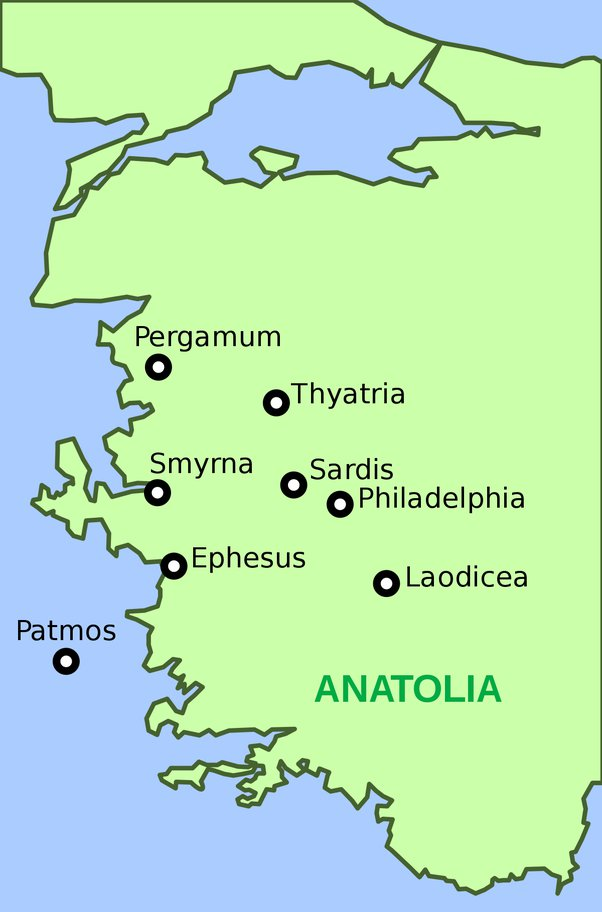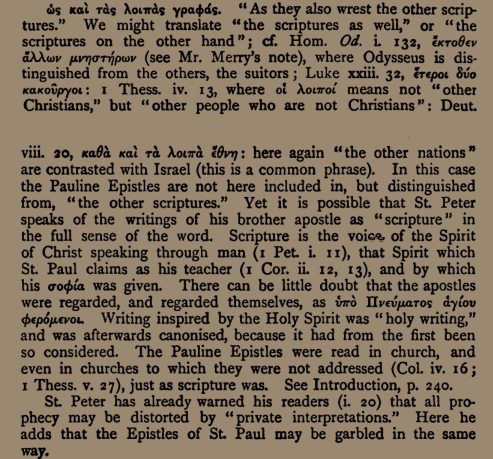Q. Many people appeal to 2nd Peter 3:16 as demonstration that Peter believed Paul’s letters to be scripture. However, is there any alternative interpretations offered as to what it means when Peter says “as they do the other Scriptures”?
The passage:
[2Pe 3:14-18 NASB95] [14] Therefore, beloved, since you look for these things, be diligent to be found by Him in peace, spotless and blameless, [15] and regard the patience of our Lord [as] salvation; just as also our beloved brother Paul, according to the wisdom given him, wrote to you, [16] as also in all [his] letters, speaking in them of these things, in which are some things hard to understand, which the untaught and unstable distort, as [they do] also the rest of the Scriptures, to their own destruction. [17] You therefore, beloved, knowing this beforehand, be on your guard so that you are not carried away by the error of unprincipled men and fall from your own steadfastness, [18] but grow in the grace and knowledge of our Lord and Savior Jesus Christ. To Him [be] the glory, both now and to the day of eternity. Amen.
In 2 Peter 3:16 (concerning which scholars tend to be in agreement that the two Peter letters were not written by the same author, the letters being pseudepigraphal), "Peter" refers to "Paul's letters." The significance of that is lost on, well, pretty much everyone because they fail to realize what an "Apostle" is:
APOSTLE AND APOSTLESHIP:
By: Kaufmann Kohler
Apostle (Greek ἀπόστολοσ, from ἀποστήλλειν, "to send"), a person delegated for a certain purpose; the same as sheliaḦ or sheluaḦ in Hebrew, one invested with representative power. "Apostoloi" was the official name given to the men sent by the rulers of Jerusalem to collect the half-shekel tax for the Temple, the tax itself being called "apostolé." See Theod. Reinach, "Textes Grecs et Romains, etc.," 1895, p. 208, and also Grätz, "Gesch. der Juden," iv. 476, note 21, where Eusebius is quoted as saying: "It is even yet a custom among the Jews to call those who carry about circular letters from their rulers by the name of apostles"; Epiphanius, "Hæreses," i. 128: "The so-called apostoloi are next in rank to the patriarchs, with whom they sit in the Sanhedrin, deciding questions of the Law with them." The emperor Honorius, in his edict of 399, mentions "the archisynagogues, the elders and those whom the Jews call apostoloi, who are sent forth by the patriarch at a certain season of the year to collect silver and gold from the various synagogues" ("Cod. Theodos." xvi. 8, 14, 29. Compare Mommsen, "Corpus Inscr. Lat." ix. 648. See Apostolé)...
There seems to be a suggestion in the NT portrait of Paul as having achieved that very high rank:
[Act 22:1-5 NKJV] 1 "Brethren and fathers, hear my defense before you now." 2 And when they heard that he spoke to them in the Hebrew language, they kept all the more silent. Then he said: 3 "I am indeed a Jew, born in Tarsus of Cilicia, but brought up in this city at the feet of Gamaliel, taught according to the strictness of our fathers' law, and was zealous toward God as you all are today. [4] "I persecuted this Way to the death, binding and delivering into prisons both men and women, [5] "as also the high priest bears me witness, and all the council of the elders, from whom I also received letters to the brethren, and went to Damascus to bring in chains even those who were there to Jerusalem to be punished...
This passage from Galatians alludes to and "fulfils" (brings new meaning to) the Ecclesiastes verse:
[Gal 1:13-14 NKJV] [13] For you have heard of my former conduct in Judaism, how I persecuted the church of God beyond measure and [tried to] destroy it. [14] And I advanced in Judaism beyond many of my contemporaries in my own nation, being more exceedingly zealous for the traditions of my fathers.
[Ecc 2:9 NKJV] [9] So I became great and excelled more than all who were before me in Jerusalem. Also my wisdom remained with me.
Paul's claim cannot be verified historically.
However, Paul is said to have abandoned all that when God sovereignly called him in order to serve as Christ's apostle:
[Gal 1:15-17 NKJV] [15] But when it pleased God, who separated me from my mother's womb and called [me] through His grace, [16] to reveal His Son in me, that I might preach Him among the Gentiles, I did not immediately confer with flesh and blood, [17] nor did I go up to Jerusalem to those [who were] apostles before me; but I went to Arabia, and returned again to Damascus.
So my view is that what 2 Peter 3 refers to regarding Paul is that, as an Apostle of Jesus Christ, his letters had Christ's authority and he was an authorized producer and dispenser of letters, as well as to collect money on behalf of Christ:
[1Co 16:1-4 NKJV] 1 Now concerning the collection for the saints, as I have given orders to the churches of Galatia, so you must do also: 2 On the first [day] of the week let each one of you lay something aside, storing up as he may prosper, that there be no collections when I come. 3 And when I come, whomever you approve by [your] letters I will send to bear your gift to Jerusalem. [4] But if it is fitting that I go also, they will go with me.
[Rom 15:25-28 NKJV] [25] But now I am going to Jerusalem to minister to the saints. [26] For it pleased those from Macedonia and Achaia to make a certain contribution for the poor among the saints who are in Jerusalem. [27] It pleased them indeed, and they are their debtors. For if the Gentiles have been partakers of their spiritual things, their duty is also to minister to them in material things. [28] Therefore, when I have performed this and have sealed to them this fruit, I shall go by way of you to Spain.
ANSWER ALERT:
my alternate interpretation is that Paul was writing circular letters and collecting money in his role as an Apostle of Christ:
[Eph 1:1 NKJV] 1 Paul, an apostle of Jesus Christ by the will of God, To the saints who are in Ephesus, and faithful in Christ Jesus:
Supplementary info:
In Ephesians 1:1, however some manuscripts (don't know how many off the top of my head, or it might just be one) have no addressee, suggesting that it was a "circular letter." Is a "circular letter" one written on a round piece of parchment? No, but rather like a personalized mass mailing. They'd just put a city's name at the top and carry it there.
Wikipedia suggests that Paul was writing 2 Peter to gatherings in Asia Minor, John's territory, though the letters do not mention any contact with John. But you can see that from Patmos, your first stop is Ephesus:

Then you work north, and around and down. We read about these seven cities in the Revelation warnings in the first few chapters. The mail route to the seven congregations in seven cities is similar to the constellation Pleiades, which is comprised of seven stars.
All this also answers the question I and others have raised about Paul's authority. And again, none of any of this is historically supported.

